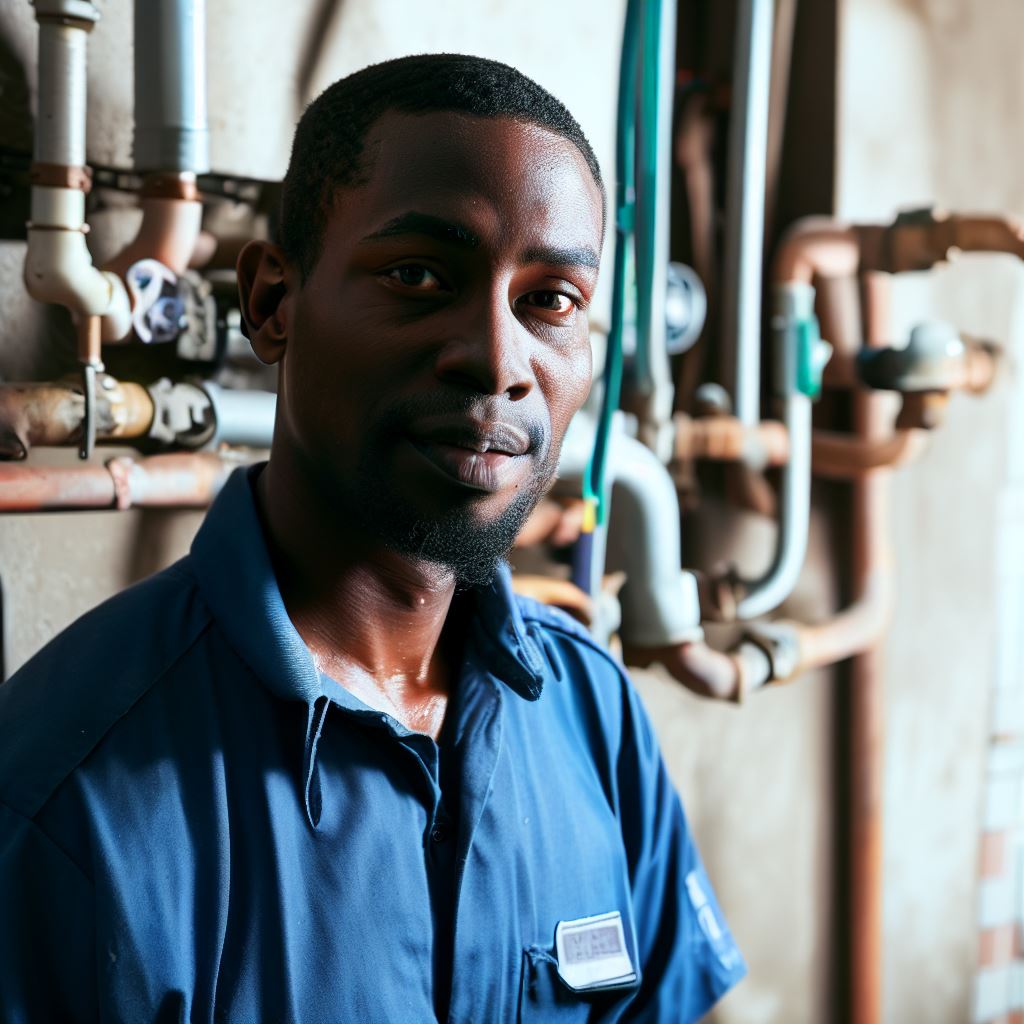Introduction
Let’s explore local plumbing codes in Nigeria: An essential reference guide.
Understanding the importance of plumbing codes in Nigeria
Plumbing codes exist to ensure the safety and functionality of plumbing systems in buildings.
In the realm of construction and infrastructure development, adherence to standardized codes and regulations is paramount.
Within this context, plumbing stands as a foundational component, ensuring the safe and efficient conveyance of water and waste within a structure.
In Nigeria, as in many countries, the implementation of local plumbing codes plays a crucial role in maintaining the integrity and functionality of plumbing systems.
This guide seeks to shed light on the intricacies of plumbing regulations within Nigeria, offering a comprehensive overview of the specific codes that govern this vital aspect of infrastructure.
By delving into the details of these codes, we aim to provide a valuable resource for contractors, plumbers, engineers, and anyone involved in the construction industry.
Throughout this guide, we will explore the historical development and evolution of plumbing codes in Nigeria, emphasizing their significance in ensuring public health and safety.
Armed with this knowledge, stakeholders in the construction industry will be better equipped to navigate the challenges and complexities that often accompany plumbing projects, ultimately contributing to the creation of safer, more efficient built environments for all Nigerians.
This blog post will serve as an essential reference guide for individuals seeking to understand and comply with local plumbing codes in Nigeria.
Plumbing codes are a set of regulations, standards, and guidelines that dictate the design, installation, and maintenance of plumbing systems in Nigeria.
Overview of Plumbing Codes
Definition of plumbing codes
Plumbing codes are a set of regulations and standards that govern the design, installation, and maintenance of plumbing systems.
These codes ensure the safety, functionality, and efficiency of plumbing systems.
Purpose of plumbing codes
The primary purpose of plumbing codes is to protect public health and safety by ensuring that plumbing systems are properly installed, maintained, and operated.
Plumbing codes also provide guidelines for water conservation and environmental protection.
Scope of plumbing codes in Nigeria
In Nigeria, plumbing codes cover a wide range of aspects related to plumbing systems.
They include the design and installation of water supply and distribution systems, sewage and drainage systems, and gas supply systems.
Plumbing codes in Nigeria also address aspects such as the choice and installation of piping materials, water heating systems, plumbing fixtures and fittings, and backflow prevention devices.
The codes prescribe the minimum standards that plumbers, contractors, and designers must adhere to, ensuring that all plumbing work is carried out to a high standard.
The codes also specify the qualifications, training, and certification required to work as a plumber in Nigeria. This helps ensure that only competent individuals carry out plumbing work.
Specific requirements outlined in the plumbing codes
Some of the specific requirements outlined in the plumbing codes include:
Water Supply Systems
The codes specify the minimum diameter of water supply pipes and the maximum allowable pressure.
They also regulate the installation of water meters, valves, and pressure regulators.
Cross-connections between potable water systems and non-potable sources are strictly prohibited.
Sewage and Drainage Systems
The plumbing codes provide guidelines for the installation of sewage and drainage pipes, ensuring proper flow and preventing blockages.
Ventilation systems for sewage and drainage systems are also covered in the codes to prevent the buildup of harmful gases.
Gas Supply Systems
The codes outline safety requirements for the installation and operation of gas supply systems.
Gas pipes must be installed and maintained in a way that prevents leaks and ensures the proper functioning of gas appliances.
Plumbing Fixtures and Fittings
The codes specify the standards for plumbing fixtures such as toilets, sinks, showers, and bathtubs.
They also provide guidelines for the installation of fixtures, including proper positioning and anchoring.
Backflow Prevention
Plumbing codes in Nigeria include measures to prevent the backward flow of contaminated water into the potable water supply.
The installation of backflow prevention devices, such as check valves and vacuum breakers, is required in certain situations.
In fact, plumbing codes in Nigeria are essential for ensuring the safety, functionality, and efficiency of plumbing systems.
They cover a broad range of aspects related to plumbing and provide guidance on design, installation, and maintenance practices.
By adhering to these codes, plumbers and contractors can contribute to the overall improvement of plumbing standards in the country.
Read: Apprenticeships in Plumbing: Opportunities in Nigeria Today
Evolution of Plumbing Codes in Nigeria
Historical background
The development of plumbing codes in Nigeria can be traced back to the colonial era.
During this time, the British introduced plumbing systems in major urban areas. The first plumbing regulations were put in place to ensure the proper installation of these systems.
These regulations primarily focused on public health and safety concerns.
Milestones and key developments
In the 1960s, Nigeria gained independence, leading to the development of its own plumbing codes.
The Nigerian government recognized the need for comprehensive regulations to address the growing urban population.
Milestones include the establishment of plumbing boards and the enactment of the Plumbing Code Act.
The Plumbing Code Act provided a legal framework for the regulation of plumbing activities.
It outlined the requirements for plumbing licenses, qualifications of practitioners, and penalties for non-compliance.
Over the years, amendments were made to the Plumbing Code Act to keep up with technological advancements.
Influence of international standards on local codes
Nigeria has been influenced by international standards in the development of its plumbing codes.
International bodies such as the International Association of Plumbing and Mechanical Officials (IAPMO) have provided technical support.
The World Plumbing Council’s guidelines have also influenced the content of local codes.
Nigeria adopted some of the best practices from these international standards to enhance its plumbing regulations.
International collaboration has contributed to the improvement of plumbing systems and practices in Nigeria.
The evolution of plumbing codes in Nigeria has been a gradual process, shaped by historical, political, and global factors.
From the colonial era to independence, the country has recognized the importance of regulating plumbing systems to ensure public health and safety.
Milestones and key developments, such as the establishment of plumbing boards and the Plumbing Code Act, have been instrumental in advancing plumbing regulations.
These developments have provided a legal framework for licensing, qualification requirements, and enforcement measures.
Furthermore, international standards and guidelines have played a significant role in influencing Nigerian plumbing codes.
The technical support provided by organizations like IAPMO and the World Plumbing Council has helped Nigeria adopt best practices and improve its plumbing systems.
Overall, the evolution of plumbing codes in Nigeria reflects the country’s commitment to creating and maintaining high-quality plumbing systems that meet international standards.
As Nigeria continues to grow and develop, it is expected that its plumbing regulations will evolve further to address emerging challenges and advancements in the field.
Read: Plumbing Regulations in Nigeria: Legal Requirements Explained
Significance of Local Plumbing Codes
Ensuring public health and safety
Local plumbing codes play a vital role in ensuring the health and safety of the public.
They establish guidelines and regulations that must be followed during plumbing installations.
Compliance with these codes helps prevent the spread of diseases and contamination of water supply.
By adhering to plumbing codes, potential hazards and risks are minimized, ensuring the well-being of individuals.
Promoting effective water supply and sanitation systems
Local plumbing codes aim to promote effective and efficient water supply and sanitation systems.
They provide guidelines on proper pipe sizing, design, and installation techniques.
Following these codes ensures that water is delivered safely and efficiently to homes and buildings.
It also ensures that waste is disposed of properly, preventing pollution and maintaining a healthy environment.
Minimizing environmental impact
Local plumbing codes contribute to the reduction of environmental impact caused by plumbing systems.
They promote the use of energy-efficient fixtures, such as low-flow toilets and faucets.
By mandating the proper disposal of wastewater, these codes help prevent contamination of natural resources.
Compliance with plumbing codes ensures that plumbing systems are sustainable and eco-friendly.
Ensuring quality and standards in construction
Local plumbing codes are essential in maintaining quality and standards in plumbing construction.
They outline requirements for the materials, methods, and workmanship used in plumbing installations.
Compliance with these codes ensures that plumbing systems are durable, reliable, and long-lasting.
It also helps protect consumers from substandard work and promotes accountability among plumbers and contractors.
In review, local plumbing codes in Nigeria serve as an essential reference guide for various reasons.
They are crucial for ensuring public health and safety by establishing guidelines to prevent the spread of diseases and contamination of water supply.
Moreover, these codes promote effective water supply and sanitation systems, aiming for efficient delivery of water and proper waste disposal.
Compliance with plumbing codes also minimizes environmental impact by encouraging sustainability and eco-friendly practices.
Lastly, local plumbing codes contribute to maintaining quality and standards in plumbing construction, ensuring durable and reliable systems while protecting consumers from substandard work.
Read: Tools of the Trade: Essential Equipment for Nigerian Plumbers

Understanding Nigerian Plumbing Codes
Regulatory bodies responsible for plumbing codes
- Nigerian Society of Engineers (NSE) oversees plumbing regulations and standards.
- Federal Ministry of Works and Housing (FMWH) collaborates with NSE to enforce codes.
- State Ministries of Housing play a vital role in implementing plumbing codes at the local level.
Key documents, acts, and regulations governing plumbing codes
- National Building Code: Provides guidelines for plumbing installations in Nigeria.
- Plumbing Regulation Act: Enforces standards and certifies professionals in the plumbing industry.
- Nigerian National Plumbing (NNP) Standard: Specific technical requirements for plumbing installations.
- Nigerian Code of Practice for Water Supply: Covers water supply plumbing systems.
Compliance requirements and procedures
- Certification: Plumbers and plumbing contractors must be certified by the FMWH or state regulatory bodies.
- Inspection: Local authorities inspect plumbing systems during and after installation for compliance.
- Permits: A plumbing permit must be obtained before starting any plumbing work.
- Materials and fixtures: Only approved materials and fixtures should be used in plumbing installations.
- Design and layout: Plumbing plans must comply with approved standards and provide proper drainage and ventilation.
- Water conservation: Plumbing codes in Nigeria promote water conservation practices.
- Testing and commissioning: Plumbing systems must undergo testing and commissioning by certified professionals.
- Maintenance: Regular maintenance of plumbing systems is crucial to ensure compliance with codes.
Benefits of complying with Nigerian plumbing codes
- Safety: Compliance ensures that plumbing systems are safe for use and free from potential hazards.
- Health: Proper plumbing code compliance prevents contamination and protects public health.
- Sustainability: Codes promote efficient water usage, contributing to environmental sustainability.
- Legal compliance: Non-compliance can lead to penalties, legal actions, or denial of insurance claims.
- Quality and durability: Adhering to codes ensures high-quality materials, installations, and long-lasting plumbing systems.
In brief, understanding Nigerian plumbing codes is essential for both professionals and homeowners.
The regulatory bodies, key documents, and compliance requirements outlined in this guide provide a foundation for ensuring safe and efficient plumbing installations.
By complying with these codes, stakeholders contribute to the overall well-being of individuals, communities, and the environment.
Read: Becoming a Plumber in Nigeria: Skills and Training Needed
Key Components of Plumbing Codes in Nigeria
Materials and Equipment Standards
Plumbing codes in Nigeria include specific standards for materials and equipment used in plumbing systems.
These standards ensure that only high-quality and durable materials are used in plumbing installations.
Examples of materials and equipment covered in these standards include pipes, fittings, valves, and fixtures.
The codes also outline requirements for the testing and certification of these materials and equipment.
By adhering to these standards, plumbing professionals can guarantee the safety and functionality of their installations.
Design and Installation Guidelines
Plumbing codes in Nigeria provide detailed guidelines for the design and installation of plumbing systems.
These guidelines ensure that plumbing installations are efficient, effective, and meet the needs of the users.
They cover various aspects such as pipe sizing, drainage systems, water supply systems, and ventilation requirements.
Codes also outline rules for proper installation techniques and practices to prevent leaks, damage, and system failures.
Following these guidelines helps plumbers design and install systems that meet the highest standards of quality and safety.
Maintenance and Repair Regulations
Plumbing codes in Nigeria include regulations for the ongoing maintenance and repair of plumbing systems.
These regulations aim to ensure the long-term performance and functionality of plumbing installations.
They outline the responsibilities of property owners and occupants in terms of maintenance and repair activities.
Codes also cover requirements for regular inspections, leak detection, and the prevention of water waste.
Complying with these regulations helps extend the lifespan of plumbing systems and minimize issues and disruptions.
Inspection and Certification Processes
Plumbing codes in Nigeria establish inspection and certification processes to verify compliance with the codes.
These processes involve the examination of plumbing installations by qualified inspectors.
Inspectors assess whether the installations meet the requirements outlined in the codes.
If the installations pass the inspection, a certification is issued to acknowledge compliance with the codes.
Inspection and certification processes ensure public safety and provide confidence in the quality of plumbing systems.
By understanding the key components of plumbing codes in Nigeria, plumbing professionals can ensure compliance with these standards.
Materials and equipment must meet specific requirements, while design and installation guidelines ensure efficient and safe systems.
Regular maintenance and repair activities are regulated, and inspection and certification processes confirm compliance.
By following these codes, Nigeria can establish a robust plumbing infrastructure that prioritizes safety and functionality.
Common Challenges and Solutions
Lack of awareness and understanding
Many individuals in Nigeria are unaware of the local plumbing codes and their importance.
Lack of understanding regarding the specific regulations and requirements outlined in the codes.
This lack of awareness and understanding can lead to improper plumbing installations and practices.
Solution
Increasing awareness through educational campaigns and outreach programs.
Conducting workshops and seminars to educate individuals about the local plumbing codes.
Non-compliance issues
Non-compliance with local plumbing codes is a significant problem in Nigeria.
Some plumbers and contractors may intentionally disregard the codes due to ignorance or cost-cutting motivations.
This can result in substandard plumbing installations, safety hazards, and environmental concerns.
Solution
Strengthening enforcement mechanisms to ensure compliance with plumbing codes.
Imposing penalties and fines for non-compliance to deter individuals from violating the regulations.
Addressing these challenges through education and enforcement
Education plays a vital role in addressing the lack of awareness and understanding of plumbing codes.
By educating individuals about the importance of compliance, they are more likely to adhere to the regulations.
Effective enforcement is necessary to ensure that the plumbing codes are followed consistently.
Government agencies and regulatory bodies should be responsible for monitoring compliance.
Regular inspections and audits should be conducted to identify non-compliance and take necessary actions.
Collaboration between industry stakeholders, such as plumbers, contractors, and regulatory bodies, is crucial.
Stakeholders should work together to develop strategies for improving compliance with plumbing codes.
Training and certification programs should be established to enhance the skills and knowledge of plumbers.
By promoting professionalism and expertise, the industry can strive towards better compliance.
Public awareness campaigns should be conducted to inform homeowners and building owners about their responsibilities.
In short, the lack of awareness and understanding, non-compliance issues, and the importance of education and enforcement are common challenges faced in relation to local plumbing codes in Nigeria.
Increasing awareness, strengthening enforcement mechanisms, and promoting collaboration among industry stakeholders are essential for addressing these challenges.
By working together, Nigeria can improve compliance with plumbing codes and ensure safer and more efficient plumbing installations throughout the country.
Consequences of Non-Compliance
Non-compliance with local plumbing codes in Nigeria can have serious repercussions, both legally and in terms of public health and safety.
Failure to adhere to these codes can also result in potential damage to infrastructure and the environment.
Legal implications and penalties
Individuals or businesses found in violation of local plumbing codes may face legal consequences.
Penalties for non-compliance can range from fines to imprisonment, depending on the severity of the violation.
Legal proceedings can be time-consuming and costly, leading to financial burdens and reputational damage.
Non-compliant plumbing work may be subject to removal or correction at the expense of the violator.
Risks to health and safety
Non-compliant plumbing installations can pose significant risks to public health and safety.
Improperly installed or faulty plumbing systems can lead to water contamination, causing waterborne diseases.
Leakage, pipe bursts, or sewage overflow due to non-compliance can result in accidents, property damage, and injuries.
Non-compliant plumbing can contribute to the spread of pests, such as rodents and insects, creating unsanitary conditions.
Potential damage to infrastructure and environment
Non-compliant plumbing installations can negatively impact existing infrastructure, leading to costly repairs or replacements.
Inadequate drainage systems can cause flooding, erosion, and damage to roads, buildings, and surrounding structures.
Improper disposal of wastewater or chemicals can contaminate soil, groundwater, or nearby bodies of water, harming the environment.
Non-compliant plumbing can contribute to water scarcity by inefficiently using or wasting limited water resources.
It is crucial for individuals, plumbers, and building contractors to understand and adhere to local plumbing codes to avoid the consequences of non-compliance.
By doing so, they can ensure the safety, health, and well-being of the community, protect the environment, and avoid legal troubles.
Importance of Hiring Certified Plumbers
Qualifications and certifications
Certified plumbers have undergone extensive training and education to acquire the necessary qualifications.
They hold valid certifications that prove their competence and expertise in the field of plumbing.
Hiring certified plumbers ensures that you are working with professionals who are knowledgeable and skilled.
These plumbers have acquired the necessary licenses and permits to carry out plumbing work legally.
Expertise in local plumbing codes
Certified plumbers are well-versed in the local plumbing codes and regulations in Nigeria.
They understand the specific requirements and standards that must be met for different plumbing installations.
Plumbing codes are in place to ensure safety, efficiency, and proper functioning of plumbing systems.
By hiring certified plumbers, you can be confident that your plumbing work will be done in accordance with these codes.
Ensuring compliance and peace of mind
Local plumbing codes are put in place to protect public health and safety.
Non-compliance with these codes can lead to serious consequences, such as damage to property or health hazards.
When you hire certified plumbers, you can rest assured that your plumbing work will meet all the necessary standards.
This ensures that your plumbing system is safe, reliable, and in compliance with the regulations.
Hiring certified plumbers also gives you peace of mind, knowing that professionals are handling the job.
You can trust their expertise and rely on their ability to solve any plumbing issues that may arise.
In essence, the importance of hiring certified plumbers cannot be overstated.
Their qualifications, certifications, and expertise in local plumbing codes make them the best choice for any plumbing work.
By ensuring compliance with regulations and offering peace of mind, certified plumbers guarantee the safety and efficiency of your plumbing system.
Conclusion
Local plumbing codes in Nigeria play a crucial role in ensuring safe and efficient plumbing systems.
These codes cover several aspects, including pipe sizing, venting, drainage, and water supply.
Plumbing codes are established by the Standards Organization of Nigeria (SON) and must be adhered to.
Local plumbing codes are necessary to protect public health, ensure water conservation, and prevent property damage.
Adhering to these codes also helps to maintain quality standards and avoid costly repairs or legal consequences.
As a responsible citizen, it is essential to stay updated on local plumbing codes and regulations.
Consulting with plumbing professionals and obtaining the necessary permits will help ensure compliance.
By following local plumbing codes, you contribute to a safer, more efficient, and sustainable plumbing infrastructure in Nigeria.




